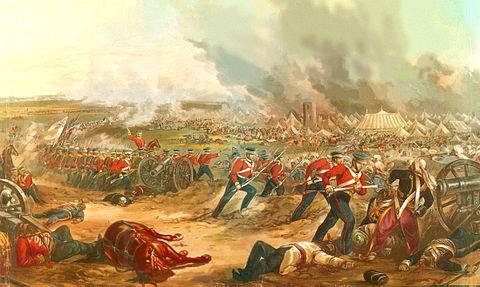Decline:
After Ranjit Singh's death in 1839, the empire was severely weakened by internal divisions and political mismanagement. This opportunity was used by the British East India Company to launch the First Anglo-Sikh War.
The Battle of Ferozeshah in 1845 marked many turning points, the British encountered the Punjab Army, opening with a ***-duel in which the Sikhs "had the better of the British artillery". As the British made advances, Europeans in their army were specially targeted, as the Sikhs believed if the army "became demoralized, the backbone of the enemy's position would be broken". The fighting continued throughout the night. The British position "grew graver as the night wore on", and "suffered terrible casualties with every single member of the Governor General's staff either killed or wounded". Nevertheless, the British army took and held Ferozeshah. British General Sir James Hope Grant recorded: "Truly the night was one of gloom and forbidding and perhaps never in the annals of warfare has a British Army on such a large scale been nearer to a defeat which would have involved annihilation."
The reasons for the withdrawal of the Sikhs from Ferozeshah are contentious. Some believe that it was treachery of the non-Sikh high command of their own army which led to them marching away from a British force in a precarious and battered state. Others believe that a tactical withdrawal was the best policy.[citation needed]
The Sikh empire was finally dissolved at the end of the Second Anglo-Sikh War in 1849 into separate princely states and the British province of Punjab. Eventually, a Lieutenant Governorship was formed in Lahore as a direct representative of the British Crown.
After Ranjit Singh's death in 1839, the empire was severely weakened by internal divisions and political mismanagement. This opportunity was used by the British East India Company to launch the First Anglo-Sikh War.
The Battle of Ferozeshah in 1845 marked many turning points, the British encountered the Punjab Army, opening with a ***-duel in which the Sikhs "had the better of the British artillery". As the British made advances, Europeans in their army were specially targeted, as the Sikhs believed if the army "became demoralized, the backbone of the enemy's position would be broken". The fighting continued throughout the night. The British position "grew graver as the night wore on", and "suffered terrible casualties with every single member of the Governor General's staff either killed or wounded". Nevertheless, the British army took and held Ferozeshah. British General Sir James Hope Grant recorded: "Truly the night was one of gloom and forbidding and perhaps never in the annals of warfare has a British Army on such a large scale been nearer to a defeat which would have involved annihilation."
The reasons for the withdrawal of the Sikhs from Ferozeshah are contentious. Some believe that it was treachery of the non-Sikh high command of their own army which led to them marching away from a British force in a precarious and battered state. Others believe that a tactical withdrawal was the best policy.[citation needed]
The Sikh empire was finally dissolved at the end of the Second Anglo-Sikh War in 1849 into separate princely states and the British province of Punjab. Eventually, a Lieutenant Governorship was formed in Lahore as a direct representative of the British Crown.
Decline:
After Ranjit Singh's death in 1839, the empire was severely weakened by internal divisions and political mismanagement. This opportunity was used by the British East India Company to launch the First Anglo-Sikh War.
The Battle of Ferozeshah in 1845 marked many turning points, the British encountered the Punjab Army, opening with a gun-duel in which the Sikhs "had the better of the British artillery". As the British made advances, Europeans in their army were specially targeted, as the Sikhs believed if the army "became demoralized, the backbone of the enemy's position would be broken". The fighting continued throughout the night. The British position "grew graver as the night wore on", and "suffered terrible casualties with every single member of the Governor General's staff either killed or wounded". Nevertheless, the British army took and held Ferozeshah. British General Sir James Hope Grant recorded: "Truly the night was one of gloom and forbidding and perhaps never in the annals of warfare has a British Army on such a large scale been nearer to a defeat which would have involved annihilation."
The reasons for the withdrawal of the Sikhs from Ferozeshah are contentious. Some believe that it was treachery of the non-Sikh high command of their own army which led to them marching away from a British force in a precarious and battered state. Others believe that a tactical withdrawal was the best policy.[citation needed]
The Sikh empire was finally dissolved at the end of the Second Anglo-Sikh War in 1849 into separate princely states and the British province of Punjab. Eventually, a Lieutenant Governorship was formed in Lahore as a direct representative of the British Crown.
0 Комментарии
0 Поделились
0 предпросмотр




